Can I Add Essential Oils to My Bath
Bath Rubber: how to use essential oils safely in the bathroom
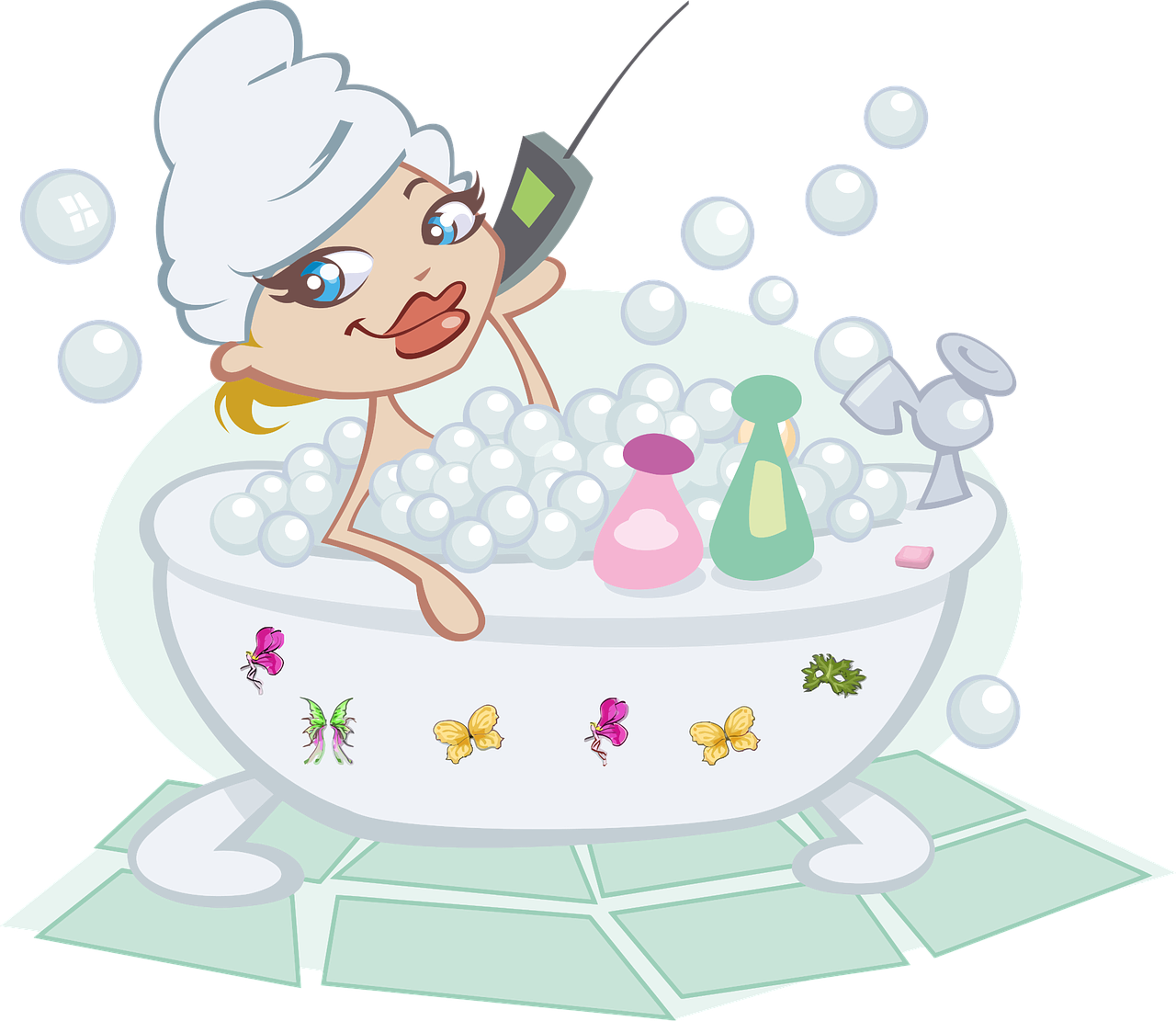 An aromatherapy bath can be a very relaxing and therapeutic experience, and it is one of the most popular means to use essential oils. Nonetheless, it tin very easily turn unpleasant if you don't follow 1 simple rule – disperse! Essential oils are not water soluble, and so pouring them directly into a bath will result in a film of undiluted essential oils sitting on superlative, waiting patiently for your tender flesh to enter the water. Because the oils are warmed up by the water, and also cannot evaporate, they ofttimes sting like crazy.
An aromatherapy bath can be a very relaxing and therapeutic experience, and it is one of the most popular means to use essential oils. Nonetheless, it tin very easily turn unpleasant if you don't follow 1 simple rule – disperse! Essential oils are not water soluble, and so pouring them directly into a bath will result in a film of undiluted essential oils sitting on superlative, waiting patiently for your tender flesh to enter the water. Because the oils are warmed up by the water, and also cannot evaporate, they ofttimes sting like crazy.
Many take fabricated this mistake, equally you can come across in our adverse reaction reports hither . Unfortunately, some essential oil users endeavour to dilute essential oils in substances that exercise not work as emulsifiers and will not disperse essential oils, as y'all tin see in the case where a mother diluted some tangerine oil in full fat milk, resulting in a nasty reaction in her ii daughters.
Although there is no such affair as essential oils that would exist soluble in h2o, that does not mean y'all cannot use them in your bath. Essential oils can be dispersed in water and nosotros are going to tell y'all how to do this safely. We partnered with Deborah Kallevig from www.unfussed.com to assemble a listing of substances yous either already have at home or tin easily obtain, that tin exist efficiently used to disperse essential oils in your bath. Nosotros have highlighted those substances that have a simulated reputation for being suitable (full-fatty milk, epsom salts etc.) with an explanation why they don't work. Nosotros want you to bask stress-less and rubber baths!
Delight note: the information below is based the assumption that each ingredient would be used 'every bit is' and non as a minor ingredient in a formulated product. Always blank in mind safety maximums for specific essential oils!
What to useto disperse essential oils in water
Household ingredients that tin can exist used to disperse essential oils
-
Foaming products (shampoo, shower gel, bubble bath…)
Theoretically, essential oils tin can be added to ea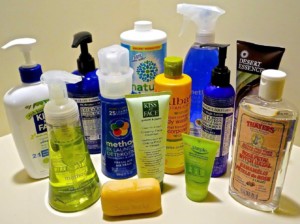 ch of these products at skin rubber levels. However, it is of import to notation that manufactured products were not formulated with the improver of whatever actress ingredients in mind. This ways that the emulsion itself, as well as the preservative, could exist seriously challenged, and neglect, if you lot add essential oils.
ch of these products at skin rubber levels. However, it is of import to notation that manufactured products were not formulated with the improver of whatever actress ingredients in mind. This ways that the emulsion itself, as well as the preservative, could exist seriously challenged, and neglect, if you lot add essential oils.
Some companies sell stock formulas or bases that DO take into business relationship the add-on of essential oils and other ingredients, usually at a maximum boosted percentage , say, ane-4% of the total corporeality by weight. You can safely add essential oils to these bases, post-obit the manufacturer's guidelines. In ½ ounce of base, one-4% is nigh five-twenty drops of essential oil.
To get around the off-the-shelf issue, it is possible to add your essential oils to the amount of production you intend to use at the time you intend to utilize it. For case, if you lot're going to wash your pilus and typically use ½ ounce shampoo, then yous tin can put that amount in a little dish, add in your rubber percentage of essential oil, mix well, and utilize. Alternatively, yous tin pour off enough for a few shampooings into a dissever container, add your essential oil percentage and store the residual unmolested. Be sure to utilize what you lot've fabricated in short order and don't effort to continue information technology for an extended period, in society to avert contamination issues.
How to use: Mix five-twenty drops of essential oil per ½ ounce (one tablespoon) of your called bath base. Either use this amount for one bath, or make upward a larger quantity for future use.
-
Vegetable oils (kokosnoot, olive, sunflower…) as a carrier oil
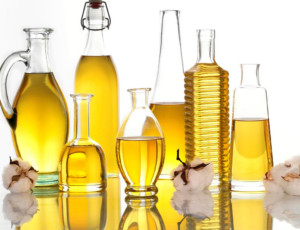 Essential oils can be safely added to whatsoever vegetable oil, properly diluted, if thoroughly mixed. These oils (also known as fixed, fatty or carrier oils) piece of work well to safely dilute and 'conduct' essential oils. However, one time added to the bath, and because oil and water don't mix, the carrier/essential oil will not disperse throughout the water. Instead, it will float on the surface and cling to the sides of the tub and your skin. Then, although the essential oils are safely diluted in the carrier, this does make for a pretty slippery, greasy bathroom feel. For a slightly less greasy floating bathroom oil, you could employ fractionated coconut oil or jojoba oil.
Essential oils can be safely added to whatsoever vegetable oil, properly diluted, if thoroughly mixed. These oils (also known as fixed, fatty or carrier oils) piece of work well to safely dilute and 'conduct' essential oils. However, one time added to the bath, and because oil and water don't mix, the carrier/essential oil will not disperse throughout the water. Instead, it will float on the surface and cling to the sides of the tub and your skin. Then, although the essential oils are safely diluted in the carrier, this does make for a pretty slippery, greasy bathroom feel. For a slightly less greasy floating bathroom oil, you could employ fractionated coconut oil or jojoba oil.
How to use: Mix 5-20 drops of essential oil per ½ ounce (1 tablespoon) of your called bath base. Either utilize this amount for i bathroom, or make upwardly a larger quantity for time to come use.
-
Fractionated coconut oil (FCO)
This is coconut oil that has gone through a physical process where the liquid portions are separated from the more solid portions based on melting points, thus the term 'fractionated'. No other change has been made to the oil, so the aforementioned guidelines employ equally to any other vegetable oil. In that location is also Caprylic/Capric Triglycerides (MCT oil), which is a specific fraction of coconut oil, the medium concatenation triglycerides, produced through the chemic process of esterification. This makes it an ester and not a true oil. These types of oil take benefits in aromatherapy because they are a fluid, virtually odorless, not-greasy carriers that are colorless and have a light, silky feeling.
How to dilute essential oils with coconut oil: Mix 5-twenty drops of essential oil per ½ ounce (1 tablespoon) of your chosen bath base. Either use this amount for one bath, or make up a larger quantity for future use. FCO and MCT oils will make for a less greasy feel.
Recommended ingredients to use essential oils in the bath
Things you need to order simply are like shooting fish in a barrel to get from suppliers and re-sellers that cater to the crafters.
-
Solubol
If you lot want to use essential oils in the bath — or dilute them in any water, to use for things similar body mists and sprays — this is the product nosotros recommend.
This is a dispersant for essential oils in h2o-based systems like body mists and sprays which are high in water or hydrosols. First mixing at a 1:1 ratio, and then add more solubol until the essential oils are fully incorporated or solubilized, which may crave a dilution ratio of one part essential oil to up to viii parts solubol. Ingredients (INCI): sucrose stearate, Helianthus annus (sunflower oil), cera alba (beeswax), Sterc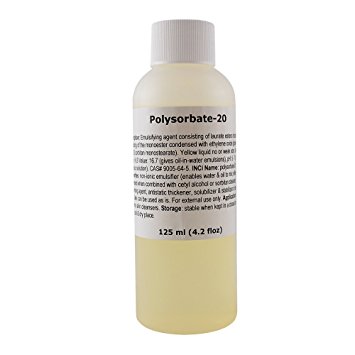 ulia urens gum, acacia gum, Propolis cera (bee propolis), glycerin, lecithin, Cocos nucifera (coconut oil), tocopherol, L-ascorbic acid, Rosmarinus officinalis (Rosemary) Leafage extract.
ulia urens gum, acacia gum, Propolis cera (bee propolis), glycerin, lecithin, Cocos nucifera (coconut oil), tocopherol, L-ascorbic acid, Rosmarinus officinalis (Rosemary) Leafage extract.
How to use: Mix 5-xx drops of essential oil with Solubol at the recommended ratio. Follow manufacturer'due south instructions.
-
Polysorbate 20
Although information technology has a largely unfounded bad rep, Polysorbate 20 is a rubber substance to use if you want to disperse essential oils in water. This is a not-ionic surfactant that can solubilize essential oils into a water based system. It is soluble in h2o and glycerin and partially soluble in fractionatedcoconut oil. Best used for adding pocket-sized amounts of essential oils – 2-3% is ideal, or whatever is pare safe, merely you can get up to 15% or and then if needed, in water based products similar room spray, body mist, linen spray. Not suitable for carrier oils. Start mixing at a 1:1 ratio.
How to employ: Mix 5-xx drops of essential oil with an equal amount of Polysorbate 20. Add to bath.
-
Polysorbate fourscore
Just similar Polysorbate 20, this is a safe substance to apply to deliquesce oils in h2o. It is a better option if you want to disperse both essential oil and a carrier oil in your bath for an extra moisturizing result. In more technical terms this is a safe non-ionic surfactant that tin can solubilize carrier oils and essential oils into a water based organisation. It is insoluble in glycerin, soluble in water, and partially soluble in fractionated coconut oil and soy bean oil. Best used for carrier plus essential oils in products like scrubs, dispersible bath oils, bath bombs, bathroom melts. Tin exist used for body sprays. Utilize up to 20% max with carrier oils and five% max for just essential oils. Start mixing at a ane:ane ratio.
How to utilize: Mix five-20 drops of essential oil with an equal amount of Polysorbate 20. Add to bath.
-
Natrasorb Bathroom: INCI Tapioca Starch
This is modified tapioca starch. Information technology will absorb and carry large quantities of carrier and essential oils and is particularly useful for bath products. The starch is processed to create footling 'pockets' to concord the oils in a solid, pulverisation form. One time the natrasorb bath comes into contact with the water, it dissolves and releases its carrier/fragrance load safely dispersing them into the water. It volition not cling or exit a moving picture on your skin or the tub. Very easy to use. Keen for including in a dry out shampoo. Use from i to l%.
How to use: Mix 5-20 drops of essential oil with 2 tablespoons of natrasorb. Add to bath. Tin be used immediately or to gear up a quantity for utilise over fourth dimension.
Click on the image below for easily shareable guidelines on proper dispersion of essential oils in your bath.
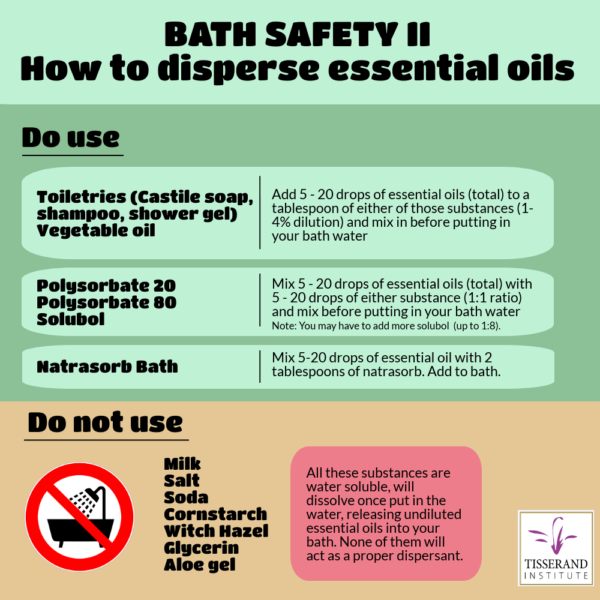
half-dozen products you cannot safely use with essential oils in the bath
These substances have been (wrongly) assumed to disperse essential oils in bathwater. Because these substances are h2o soluble, people believe that if they mix essential oils into them and then put them in water, the oils will disperse. However, oil and water don't mix! So for instance, if you mix oil into baking soda, the blistering soda will dissolve into the water, but the oils will just bladder around on height of it. This is why we recommend the products above instead, which will help the oils disperse throughout the water. Here is a list with an explanation for why each is not safe to employ in the tub because they practice not safely disperse essential oils into water.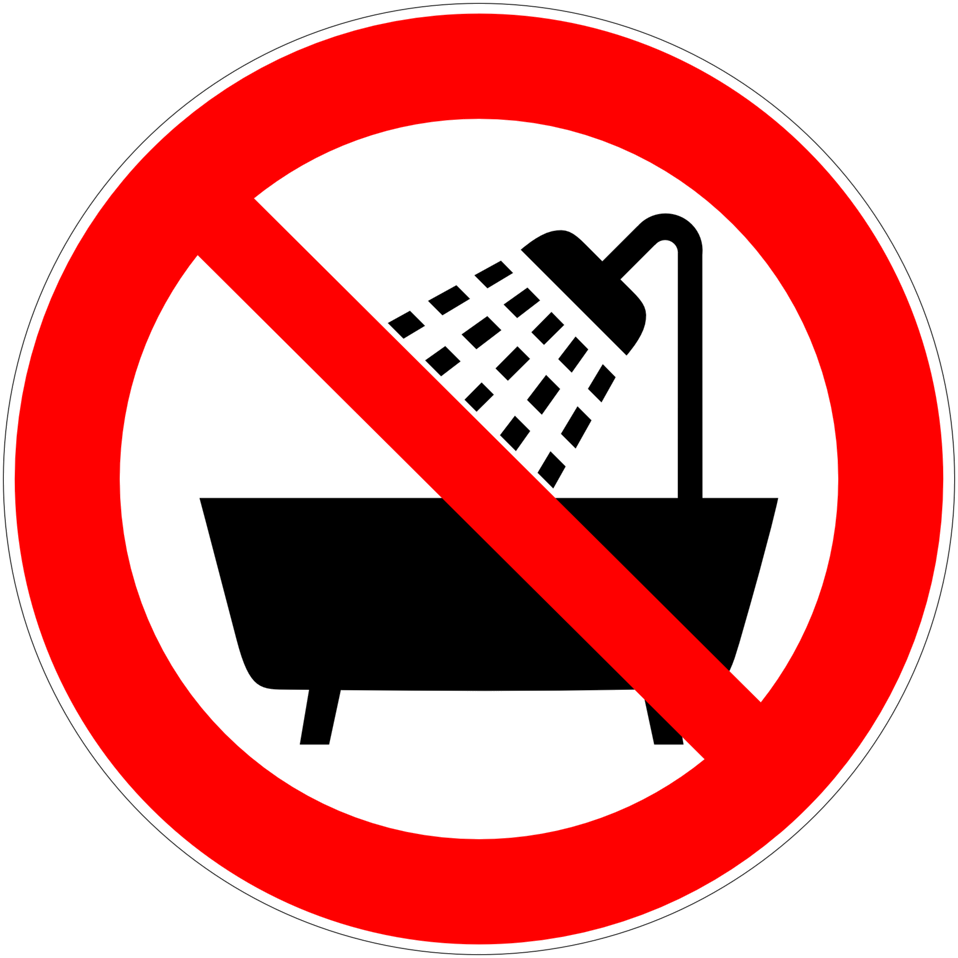
- Cornstarch
Regular cornstarch is oil and moisture absorbent in its dry course, only it has no concrete mechanism to "hold" essential oil once information technology is added to bath water. It is insoluble in cold water, and with heating, the granular structure will get-go swell then begin to break down and disperse. However, any carrier oil or essential oil that has been added to it when dry will release directly into the water, floating or clinging to surfaces and peel.
- Baking soda
Blistering soda is fully water soluble but has no physical machinery to "hold" or disperse carrier or essential oils. Y'all may be able to incorporate the oils past mixing or kneading where it appears in that location are no clumps or other visible signs of the oils, but the baking soda will deliquesce in the water, leaving the oils floating in the tub.
- Epsom salt or regular salt
Salt is fully soluble in water and will dissolve once added to your bath. All the same, adding essential oils to salt and and so stirring does not properly dilute or solubilizing the oils, even if the salts appear dry out. Salt is not a carrier for essential oils. You tin showtime dilute your essential oils with a vegetable oil and and so add to salt to create a "wet" mixture. The salt will mostly stay incorporated with the carrier oil/essential oil, but but until added to a bath. Then, the oils will exist released to float and cling to skin and surfaces.
- Milk (animal or vegetable)
Animal milks are an emulsion of fat in water. Nut and establish milks are created as stable emulsions of oil (fat) in water. All milks are water soluble and are non suitable carriers, dispersants or solubilizers for essential oils, again, because water and oil don't mix. While you may be able to create a temporary emulsion between essential oils and milk, peculiarly in high fatty content animal milk, at a molecular level there is nothing property the drops of each liquid together except for the mechanical activity of vigorous whisking. Once in the bath the essential oils float on the surface, maybe slightly more dispersed than if undiluted oils were added, simply non much. You will all the same have virtually undiluted essential oils coming into contact with your skin.
- Witch hazel
Witch Hazel Distillate is all water and completely h2o soluble. Witch Hazel with 14% alcohol is as well completely water soluble. Remember, water and oil don't mix! The alcohol proof and per centum is too low to exist an constructive solubilizer for essential oils.
- Glycerin
Glycerin is completely h2o soluble. Essential oils are oil soluble. Glycerin is not an appropriate carrier for essential oils because oil and water don't mix!
- Alcohol
At to the lowest degree 160 proof alcohol is necessary for proper dispersion of essential oils with 190 proof being preferable. Everclear and perfumer's alcohol fall into this category and the purchase of both is restricted in some areas. (Y'all cannot dissolve essential oils in vodka.) Then long as y'all starting time dissolve the essential oil in the alcohol, a sure pct of water tin be added with no separation. However when added to a bath, any solution of alcohol and essential oil floats on the surface with an oil slick appearance. The alcohol rapidly evaporates, leaving the essential oil virtually undiluted to adhere to your peel.
- Aloe vera
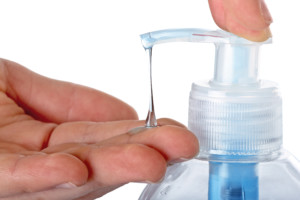 There are several types of Aloe Vera leaf excerpt – Gel, Jelly, Juice and Liquid. At that place is also a powder that is meant to be reconstituted in water. None of these are appropriate carriers for essential oils in the bathroom. Aloe Vera Jelly, which has added thickeners and preservatives, may be used every bit an essential oil base for direct application to the skin. Nevertheless, if added to the bath, the essential oils will split up and bladder, as with other watery bases.
There are several types of Aloe Vera leaf excerpt – Gel, Jelly, Juice and Liquid. At that place is also a powder that is meant to be reconstituted in water. None of these are appropriate carriers for essential oils in the bathroom. Aloe Vera Jelly, which has added thickeners and preservatives, may be used every bit an essential oil base for direct application to the skin. Nevertheless, if added to the bath, the essential oils will split up and bladder, as with other watery bases.
Where tin I get the supplies to safely put essential oils in the bath?
US
Lotioncrafter – www.lotioncrafter.com
Wholesale Supplies Plus – www.wholesalesuppliesplus.com
Ingredients To Dice For – world wide web.ingredientstodiefor.com
Making Cosmetics – www.makingcosmetics.com
Brambleberry – www.brambleberry.com
The Herbarie – www.theherbarie.com
The Formulator Sample Shop – www.formulatorsampleshop.com
The Sage – https://world wide web.thesage.com/
New Directions Aromatics – www.newdirectionsaromatics.com/
SaveonCitric – world wide web.saveoncitric.com
Camden Grey – www.camdengrey.com
Sunrose Aromatics – www.SunroseAromatics.com
Canada
Windy Point – www.windypointsoap.com
EU
Gracefruit – world wide web.gracefruit.com
The Soap Kitchen www.thesoapkitchen.co.uk
Soaposh www.soaposh.com
Phoenix products – http://world wide web.phoenixproducts.co.united kingdom
Plushfolly – http://plushfolly.com
Aromantic – aromantic.co.uk
Aroma Zone – https://www.scent-zone.com
About Deborah Kallevig:  Like so many others in the skin care business, I caught the formulating fever well later my offset career path was fix. Every bit a one-time EMT and Respiratory Therapist, as well as a skilled abode melt, I found that trading in my scrubs and apron for a lab coat was easier that I expected.
Like so many others in the skin care business, I caught the formulating fever well later my offset career path was fix. Every bit a one-time EMT and Respiratory Therapist, as well as a skilled abode melt, I found that trading in my scrubs and apron for a lab coat was easier that I expected.
I congenital on my experience with herb craft, college scientific discipline & math, and advanced blistering and kitchen skills as I delved into cosmetic formulating. I buckled downward to learn everything I could about the skin care industry, including the regulations, concepts, ingredients and lab techniques.
My self-directed learning is ongoing, through enquiry, participation in various groups, classes and workshops, and with constant trial and mistake formulating. I experience empowered to create body and beauty products that are carefully considered, elegantly made and constructive in their simplicity. I love making stuff!
Deborah is the Caput Mixtress at Unfussed Body & Beauty, www.unfussed.com and you can reach her hither: unfussed@gmail.com
Special thanks to Ginger Fifty. Moore for her input on alcohol every bit a dispersant.
Source: https://tisserandinstitute.org/safety/bath-safety/